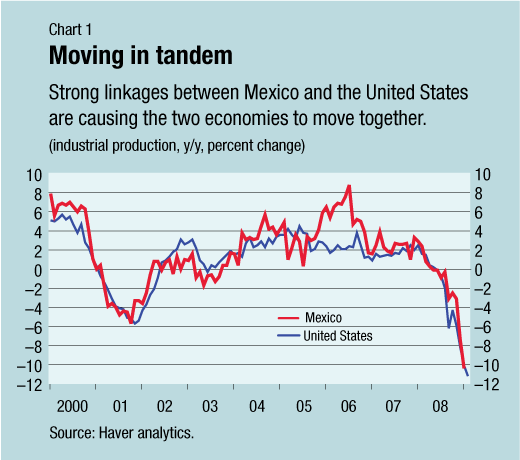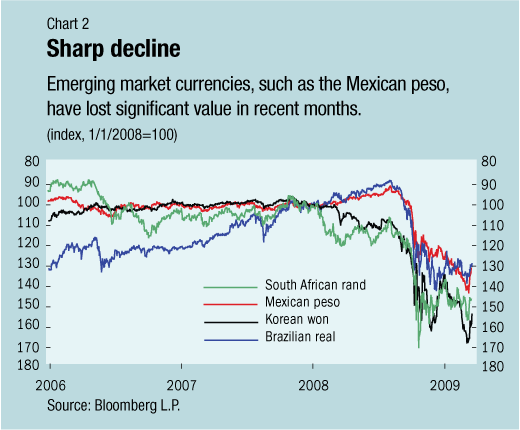
Typical street scene in Santa Ana, El Salvador. (Photo: iStock)
IMF Survey: Global Crisis Weighs on Outlook for Mexico
March 20, 2009
- U.S. contraction likely to sharply curtail Mexico's growth
- Mexico faces global crisis from far stronger position than in past
- For first time, fiscal, monetary stimulus part of policy response
While Mexico is in a much stronger position today than it was just ten years ago, the global financial crisis has worsened the near-term economic outlook, the IMF found in its latest assessment of the country’s economy.

Bricks dry in Tequixquiac, Mexico, where economy is slowing sharply because of country’s close links to United States (photo: Henry Romero/Reuters)
ECONOMIC HEALTH CHECK
Mexico’s economy is slowing down sharply because of the country’s close links to the U.S. economy. A decline in remittances and lower international oil prices (Mexico is a major exporter of oil) are also weighing on the country’s prospects. But, thanks to good economic management, Mexico has room to implement policies to offset the impact of the economic downturn.
Less prone to risk
Mexico has made significant improvements to its macroeconomic policies over the past decade. Fiscal and monetary policies are conducted in the context of rules-based frameworks which have supported important gains in policy credibility. Public, corporate, and banking sector balance sheets have also been strengthened, and a more flexible exchange rate system has reduced vulnerabilities.
But Mexico is by no means immune from the crisis. The economy is decelerating rapidly in the face of the global crisis. This reflects especially Mexico’s close links with a U.S. economy in recession (see Chart 1). Other factors, such as declining remittances and lower international oil prices, are also having an impact on growth. As a result, a sharp slowdown is expected for 2009—with GDP likely to contract more than the -0.3 percent projected in early January 2009—followed by a gradual pickup in 2010.

Headline inflation reached almost 6.5 percent year-over-year by end-December—significantly above the 3 percent target—mainly pushed up by commodity price shocks and a depreciating peso. However, inflation moderated in January this year and is expected to fall toward the target as the economy weakens.
Policy responses
David Robinson, Deputy Director of the IMF Western Hemisphere Department and Vikram Haksar, the IMF Mission Chief for Mexico, told journalists last month there has been a strong and prompt policy response by the Mexican authorities to the situation that they face. According to Robinson and Haksar, the policy actions have been particularly striking from two perspectives:
The authorities have quickly and nimbly taken a variety of measures to address liquidity strains in the financial markets. Those measures have been important in helping contain stresses over the past few months. Moreover, in the financial sector, the banking system remains well capitalized and supported by a strong regulatory framework.
On the macroeconomic side, the authorities for the first time have room to implement policies to offset the impact of the economic downturn—so-called “counter-cyclical” measures—reflecting the gains in macro performance and policy credibility over the past decade. As a result, both fiscal and monetary policy are providing timely support to the economy.
The IMF estimates that the overall fiscal stimulus will amount to about 1½ percent of GDP in 2009. The fiscal stimulus is supplemented by other measures—increased development bank lending and guarantees—to support stressed financial markets. These policies will be important to cushion the impact of the global slowdown, protect employment, and improve infrastructure. In addition, the central bank has also started to lower interest rates, providing welcome additional support to the economy.
Flexible exchange rate
The flexible exchange rate has also played an important role in helping the economy adjust to the global crisis. The currency has depreciated by about 37 percent in the last half year, broadly in line with other emerging markets (see Chart 2). However, Robinson noted that IMF analysis suggested that the currency may now be somewhat undervalued from a medium-term perspective.

Haksar remarked that companies’ balance sheets were much more robust to currency movements than in the past. Mexico’s corporate sector was entering this period of global stress with far stronger balance sheets than before. Nonetheless, given tight external financing conditions, corporate funding requirements in Mexico, as in other emerging markets, need close monitoring.
Medium-term challenges
Dealing with the impact of the global financial crisis is a crucial priority for Mexico’s government. But it is also seeking to boost the country’s growth potential over the medium term. According to Haksar, “the energy sector reform is a positive step forward but there are other areas, such as product and labor markets, infrastructure and education, and competition, where there is room to make further progress along the lines already set out in the National Development Plan.”
Another key challenge will be to offset the decline in oil-related revenues expected over the coming years. This can be achieved through a continued improvement in tax administration and by restraining public expenditure, particularly the kind that’s not going to investments.
Comments on this article should be sent to imfsurvey@imf.org


